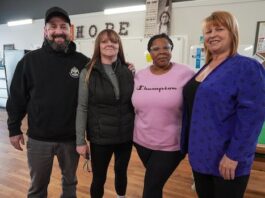
A couple of years into what at first seemed like a fairytale romance, Anna says, she started to feel like things weren’t right.
Her partner’s behaviour was becoming erratic. There was drug abuse, emotional manipulation and infidelity, the B.C. woman said, along with increasing violence directed at her and her two young sons. Her partner would lose his temper, break down doors.
She’d left twice and returned to try to make it work, but the third time, she made it clear the relationship was over. He was out of town and she told him not to come home.
But he did, arriving at the family home, putting the younger child in a truck and speeding off. Anna didn’t know where their son was for almost two weeks.
(CBC is not using the real names of the women in this story because some have active child custody cases, are concerned for their personal safety or risk losing access to their children if they are identified.)
When the case hit the courts, Anna says, things only got worse. The abduction marked the beginning of a legal fight lasting more than a decade that saw Anna lose her home and primary custody of one of her children. It cost tens of thousands of dollars and left her reputation in the community in tatters. She was largely left to navigate the system alone.
“He probably spent about $370,000 just trying to bury me … because he could. God forbid anybody ever, ever believed a word that came out of my mouth about how he treated me and what my boys went through.”
In a court ruling awarding him primary custody of the younger child, the judge found the only objective evidence in the case came from a court-appointed psychologist’s report, which stated there was a risk of alienating the child from the father should the child remain in Anna’s primary care and that the father was likely to make more responsible decisions on the child’s behalf.
The father was given primary custody despite the fact he had been charged with criminally harassing Anna and granted a discharge on the condition that he not come near her.
Shared parenting trumps safety, survivors say
Anna’s story is not unique. Over the past several months, CBC News has spoken with a dozen survivors of intimate partner violence with children in three provinces, all of whom say their former partners used the family court system to continue the patterns of abuse and control that they left the relationships to escape.
The court system does not give enough weight to the impact of domestic violence on parents in custody cases, Anna says.
“It’s not supportive of the trauma that you’re going through when you leave that relationship, and then, you’re in the worst place and you’re fighting.”

The women all say they wish judges would give more consideration to the history of abuse and the safety of survivors and children when making child-custody decisions.
Nicholas Bala, a family law professor at Queen’s University, says courts often struggle with establishing the credibility of the respective parties in high-conflict separations.
“There is often a welter of conflicting evidence,” he said. “While more education on family violence for lawyers and judges would certainly be desirable, on the whole, I think that Canadian family court judges do a good job with the resources that are available to them.”
Contact with both parents not always in child’s best interest
The problem, according to survivors and experts interviewed by CBC, is a pervasive institutional blindness to intimate partner violence combined with a principle well established in family law that it is in the best interest of the child to have contact with both parents.
Survivors and experts say it is good for children to have significant time with both parents in cases where there is no intimate partner violence. Judges recognize that and have been increasingly granting shared rather than sole parenting in cases that end up in court, according to recent research from Queen’s University in Kingston, Ont.
However, survivors also told CBC that in their experience, court emphasis on shared parenting regularly trumps the rights of domestic violence survivors and their children to be safe and protected from further trauma.
Abuse “was not at the forefront in our case and it should have been,” said Anna. “It should have been the very first thing a judge saw, but it was like it didn’t matter.”
Gillian, another survivor of domestic violence, left her partner when their son was an infant, after what she says was months of emotional abuse and controlling behaviour.

The southwestern Ontario woman’s case has not yet been to court. She said she is keeping the threatening emails and text messages from her former partner to present for consideration when a judge makes a determination on a parenting arrangement.
But she said lawyers have already warned her not to go down that path in court.
“I feel like it means nothing,” Gillian said. “I feel like I can keep documenting, keep doing this, and his word is still going to mean more than my proof. And I don’t understand that.
“My lawyer basically wanted me to take the 50/50 [shared parenting], regardless of the proof.”
Courts miss the signs, experts say
There are many reasons courts may disregard or miss signs of intimate partner violence, said Cheryl Cordeiro, a mediator, arbitrator and parenting co-ordinator in Brantford, Ont.
Those reasons include judges and other lawyers not being trained to screen for it or because of a belief among some judges that coercive or violent behaviour toward a partner does not necessarily affect children, she said.
“And so [judges] will look at it, and they will decide … well, if this was a one-time incident, it’s irrelevant. It doesn’t mean they are a bad parent. Yes, they’re a bad spouse, but they’re not a bad parent.”
Some of these issues affected the case of four-year-old Keira Kagan, who was found dead in February 2020 in Milton, Ont., along with her father, Robin Brown, in what is presumed to be a murder-suicide. Her parents divorced after what Keira’s mother, Jennifer Kagan-Viater, says was a long history of coercive control and abuse by Brown.

“As I started to recount the abuse at the hands of my ex-husband, the judge stopped me and said that it is not relevant to parenting and he is going to ignore it,” Kagan-Viater said of her own experience with family court.
She was speaking to reporters Friday before the second reading of a private member’s bill known as Keira’s Law in the House of Commons. The law aims to expand training for federal judges to include domestic violence and coercive control.
“The lack of recognition of the impact of that kind of abuse towards a woman that he had a relationship with and … not recognizing that that could have an impact on the child is, in my view, a huge gap in the system,” said Ontario Liberal MP Pam Damoff, one of the supporters of the bill, first introduced by Quebec Liberal MP Anju Dhillon.
Parental alienation a common complaint
Survivors also risk being accused of parental alienation, or poisoning a child against the other parent, if they disclose abuse in court. This can result in the loss of custody or reductions in parenting time. For this reason, family lawyers sometimes advise survivors not to talk about it.
Determining the credibility of claims of domestic violence on one side and alienation on the other is one of the most challenging tasks for family court judges, Bala said.
Having one judge per case with a specialization in family matters and more funding for legal aid would help, Bala said.

Anna got a restraining order against her ex-partner immediately after he took their son without her approval. But she said she was advised by her lawyer to drop it right away because it would look to the courts like parental alienation. She was terrified he would take their son again, she said, but she did it anyway.
“[I felt] sick to my stomach. I knew what was going to happen. But what do you do? I had no choice.”
Both Anna and Gillian were accused of parental alienation during their journey through the legal system. Other women with whom CBC spoke also sought protection from the courts after their relationships ended, the time when the risk of violence is highest.
B.C. Supreme Court spokesperson Bruce Cohen said he was not able to speak to the measures in place to protect violence survivors and their children in custody cases, noting judges only speak about their process in their reasons for judgment.
WATCH | Survivors hope new bill will raise domestic violence awareness in court system:
The House of Commons is debating a new bill that would introduce mandatory training on intimate partner violence and coercive control for federal judges. Survivors hope the bill — if passed — will protect children from abusive parents by changing how the courts deal with domestic abuse cases. 2:27
No money, no lawyer
Shortly after separating, Anna said, court applications from her ex started coming, seeking primary custody of the two children. She was ordered not to put her children into child care, making it difficult for her to earn an income.
Anna, like many women who shared their stories with CBC, was largely financially dependent on her ex-partner. When the relationship ended, Anna found herself with little money and few assets in her name.
She applied for legal aid, but her income was deemed too high to qualify for more than a few hours of help. Her former partner hired a lawyer and filed multiple actions against her, and she eventually could no longer afford a lawyer and had to represent herself.
“We burned through, in six months, about $26,000 of my mom’s money … [my lawyer] called the shots, and then, I couldn’t afford him any more. I was left hanging. So, no lawyer, and now, my mom had no money left.”
Three out of five applications for legal aid in family law cases are denied in B.C. because income requirements are too stringent, according to the advocacy group West Coast LEAF. The group is suing the B.C. government for failing to provide adequate legal aid to women fleeing abusive relationships.

Cordeiro has seen the same situation play out in Ontario, and survivors go into court unrepresented as a result. The consequences, she said, are serious.
Many domestic violence survivors don’t know how to address a court or the proper procedures for presenting evidence, Cordeiro said, and because they are experiencing trauma, they often come across as inarticulate and nervous.
“Think about it in the context of a veteran that has suffered PTSD. They can’t explain what it was that they saw. Now you’re having this woman stand here in court next to her abuser and say what he did and … be met with questions of ‘Why didn’t you leave sooner?'” Cordeiro said.
“And if that unrepresented party is up against somebody that has counsel, they’ve already lost the case before it’s begun.”













